|
|
|
Sort Order |
|
|
|
Items / Page
|
|
|
|
|
|
|
| Srl | Item |
| 1 |
ID:
138414
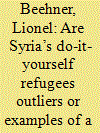

|
|
|
|
|
| Summary/Abstract |
Refugee camps are often treated as incubators of social unrest, violence, terrorism, and illicit trade. This provokes their overseers in the United Nations (UN) and other relief agencies to conduct frequent social engineering to enhance the camps’ legibility. Hence, we see orderly, perpendicular rows, standardized units from redistricting to the allocation of diapers, and so forth—all of the follies of high modernism that James Scott predicted in "Seeing Like a State," but writ small. Indeed, my qualitative research from the Za’atari refugee camp, located in Jordan along the Syrian border, indicates that refugees, especially middle-class ones like Syria’s, rebel against uniformity—or what Scott describes as “metis”—and seek to recreate their domiciles as best they can from the meager canvas tents and campers allotted to them. Put simply, they see their surroundings more as the disorderly “sidewalk ballet” of Jane Jacobs’ Greenwich Village than the high modernist yet sterile functionalism of Robert Moses. This holds important policy implications for the future of how we devise refugee camps, which increasingly resemble small cities; how we settle internally displaced persons (IDPs); and how we deal with the aftermath of mass population displacements. From direct cash transfers to the districting of refugees, some bureaucratic flexibility is required but so is an acknowledgement and embrace of refugees’ do-it-yourself ethos that is rooted in their resistance to authority and trauma from violence. Drawing from the literature in social anthropology and political science, this article presents new evidence from Za’atari that disputes the utility of a high modernist approach to the social engineering of large displaced populations.
|
|
|
|
|
|
|
|
|
|
|
|
|
|
|
|
| 2 |
ID:
125629


|
|
|
|
|
| Publication |
2013.
|
| Summary/Abstract |
Industrial action, organised attacks, and the fighting among the armed groups the government relies on for security have severely reduced Libya's oil production. Richard Cochrane assesses the near term effects of these recurrent problems.
|
|
|
|
|
|
|
|
|
|
|
|
|
|
|
|
| 3 |
ID:
025611
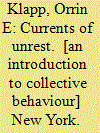

|
|
|
|
|
| Publication |
New York, Holt, Rinehart and Winston Inc, 1972.
|
| Description |
xii, 420p
|
| Standard Number |
0030853052
|
|
|
|
|
|
|
|
|
|
|
|
Copies: C:1/I:0,R:0,Q:0
Circulation
| Accession# | Call# | Current Location | Status | Policy | Location |
| 010927 | 302.17/KLA 010927 | Main | On Shelf | General | |
|
|
|
|
| 4 |
ID:
145803


|
|
|
|
|
| Summary/Abstract |
This article examines an important source of social unrest in Ottoman ports where ships could not be tied directly to the quays. In such places, boatmen ferried goods and passengers between the shore and ships that anchored offshore. Many of these boatmen wanted to work on the queue system because it provided work and income security to them. However, merchants and a few boatmen viewed this system as a major obstacle for their business to survive and grow. The Ottoman government also took part in this debate. However, rather than acting as a unitary actor, various components of the government adopted different positions on the issue. In the early twentieth century, these actors with different views and goals were involved in a series of conflicts. These conflicts forced Ottoman ruling elites to change their policies about the boat queue system several times at least but did not result in a decisive victory for one side or the other.
|
|
|
|
|
|
|
|
|
|
|
|
|
|
|
|
| 5 |
ID:
190502
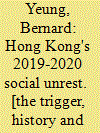

|
|
|
|
|
| Publication |
New Jersey, World Scientific, 2021.
|
| Description |
x, 173p.pbk
|
| Standard Number |
9789811225604
|
|
|
|
|
|
|
|
|
|
|
|
Copies: C:1/I:1,R:0,Q:0
Circulation
| Accession# | Call# | Current Location | Status | Policy | Location | IssuedTo | DueOn |
| 060370 | 915.005/YEU 060370 | Main | Issued | General | | RF020 | 31-May-2024 |
|
|
|
|
| 6 |
ID:
151710
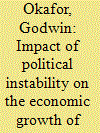

|
|
|
|
|
| Summary/Abstract |
This study contributes to the literature on political instability and economic growth by specifically investigating the impact of political instability on the economic growth of member countries of the Economic Community of West African States (ECOWAS). West Africa is regarded as the riskiest sub-region within the African continent. To achieve this objective, this study employed panel data techniques (fixed effects and generalised method of moments) on a sample of 15 ECOWAS member countries for the period 2005–2012. The findings from the analyses showed that terrorism, poor governance, social unrest, youth unemployment, death rate and natural resource rent have negative relationships with economic growth. The findings and policy implications deduced from this study could not have been any timelier considering the recent escalation of instability in West African countries and their fragile growth prospects.
|
|
|
|
|
|
|
|
|
|
|
|
|
|
|
|
| 7 |
ID:
156319
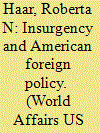

|
|
|
| 8 |
ID:
133701


|
|
|
|
|
| Publication |
2014.
|
| Summary/Abstract |
Common notions about the source of communal land conflict in Africa have long explained it as growing out of conditions of environmental scarcity. This article argues instead that the institutional structure of the legal system is central to understanding which countries are prone to experience communal land conflict. When competing customary and modern jurisdictions coexist in countries inhabited by mixed identity groups, the conflicting sources of legal authority lead to insecurity about which source of law will prevail. Because the source of law is contested, conflict parties cannot trust the legal system to predictably adjudicate disputes, which encourages the use of extrajudicial vigilante measures. Using new data on communal violence in West Africa, this argument is examined for the period 1990-2009. The results show that in countries where competing jurisdictions exist, communal land conflict is 200-350% more likely. These findings suggest that researchers should consider the role of legal institutions and processes in relation to social unrest and collective violence
|
|
|
|
|
|
|
|
|
|
|
|
|
|
|
|
| 9 |
ID:
142568
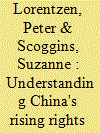

|
|
|
|
|
| Summary/Abstract |
Claims that China's people are exhibiting a rising “rights consciousness” have become commonplace, with some suggesting this phenomenon is driving political change. Yet it is often unclear what the concept means, leading to ambiguous or contradictory conclusions from field research. In order to create a basis for more systematic analysis, we develop a rational choice framework that characterizes three different factors that could lead to rights-conscious behaviour: changing values, changing government policies, and changing expectations of the behaviour of others. What rising rights consciousness implies for social stability can vary dramatically, depending on which change is at work. Rights consciousness resulting from changes in values or in shared expectations of behaviour is destabilizing for the CCP's continued rule, whereas rights consciousness derived from government policies has a stabilizing effect. While in practice these can be interrelated in complex ways, empirical research would benefit from greater attention to these distinctions.
|
|
|
|
|
|
|
|
|
|
|
|
|
|
|
|
|
|
|
|
|